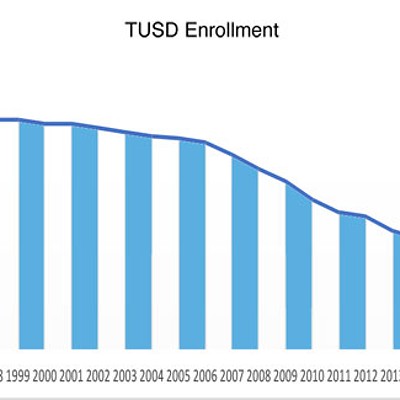Wasn't so long ago that state government was living large. We beefed up our schools, dished out more health care, built new highways, invested in research and development and even cut income taxes.
But as they say, all good things must come to an end. The economy is in a tailspin; housing values are tumbling; consumer confidence is shot; and the state is broke.
OK, maybe not broke--but facing two major budget problems.
The first and most urgent: a shortfall that's steadily climbing toward the billion-dollar threshold in the current fiscal year, which ends June 30. That means lawmakers need to cut spending, borrow money and/or dip into the rainy-day fund to bridge the gap--and with just 4 1/2 months remaining in the fiscal year, the clock is ticking.
The second (albeit related) problem: The same weakening economy that is driving the current year's shortfall will create a major problem with next year's budget. Thanks to structural growth and flatlining revenues, estimates for the 2008-2009 shortfall are somewhere in the neighborhood of $1.5 billion.
Let's start with this year: Napolitano has put forth an initial proposal to bridge an $870 million shortfall. She cuts about $75 million from various agencies and "sweeps" various state funds that are running a surplus--for example, hitting up the Clean Elections program for $24 million and the State Aviation Fund for $15 million. She proposes borrowing $393 million to fund school construction. And she dips into the state's rainy-day fund for another $263 million.
The GOP's only public counterproposal came from Rep. Russell Pearce, the head of the House Appropriations Committee, and Sen. Bob Burns, chairman of the Senate Appropriations Committee. They want to slash university spending and health-care programs for kids, suspend school construction, eliminate dental coverage for low-income Arizonans and cut back on K-12 spending. That plan is a nonstarter even among other members of the GOP caucus.
The real budget negotiations are taking place behind closed doors, with a team that includes Senate President Tim Bee, Senate Minority Leader Marsha Arzberger, House Speaker Jim Weiers and House Minority Leader Phil Lopes.
Lopes tells us progress is slow. Although the group agrees that they need to find a way to overcome the shortfall, they haven't managed to agree on much else. Lopes says a major sticking point remains whether the state should borrow money to build schools.
With those negotiations creeping along, there's been almost no discussion of next year's budget, which promises bigger problems, although some cuts made for this year's budget could be carried over to next year.
Napolitano has already revealed her plan for next year, taking advantage of a number of bookkeeping tricks. She's counting on optimistic revenue projections, dipping more into the rainy-day fund, delaying some expenses, borrowing more money for school construction and making other nips and tucks to avoid major cutbacks in spending on programs.
Napolitano would also save money by forcing counties to keep more prisoners in jails rather than shipping them off to state prisons, and by raising $90 million from people caught speeding on state highways with a new photo-enforcement program.
Some budget bills worth noting:
SB1002
PRIMARY SPONSORS: Sen. Tim Bee, et al.
WHAT IT DOES: As part of the 2006 budget agreement between GOP leaders and Gov. Janet Napolitano, the state temporarily suspended a state property tax that funds schools. This bill would permanently repeal the tax before it is slated to return in fiscal year 2009-2010. Estimated impact on that budget: $250 million.
SUPPORTERS ARGUE: Taxpayers deserve a break, especially since property taxes have been rising with property values; we tax cuts.
OPPONENTS ARGUE: With the state facing a massive deficit, this is no time to be cutting back on revenue; the average property taxpayer will save less than $100 a year, but big utilities, mines and retailers will save hundreds of thousands, if not millions, of dollars.
WHERE IT'S AT: Passed the Senate Ways and Means Committee and the Senate Rules Committee.
HB2220
PRIMARY SPONSORS: Rep. Jim Weiers, et al.
WHAT IT DOES: The House version of SB1002, above.
SUPPORTERS ARGUE: See above.
OPPONENTS ARGUE: See above.
WHERE IT'S AT: Passed the House Ways and Means Committee and the House Rules Committee.
HB2339
PRIMARY SPONSORS: Rep. Russell Pearce; Sen. Jack Harper, et al.
WHAT IT DOES: Allows citizens to donate money to a "I Didn't Pay Enough Fund" when filing their tax payments, in the event that they want to give more money to state government.
SUPPORTERS SAY: Libs are always saying that people don't mind paying more taxes for government; let's give them the chance!
OPPONENTS SAY: This is a silly stunt that's not particularly helpful to grown-up fiscal management.
WHERE IT'S AT: Assigned to the House Ways and Means Committee; not yet scheduled for a hearing.
SCR1037
PRIMARY SPONSORS: Sens. Pamela Gorman, Ron Gould, Chuck Gray, Jack Harper, Karen Johnson; Rep. Russell Pearce, et al.
WHAT IT DOES: Limits the legislative session to 100 days, no matter what. If a budget has not been produced within 100 days, then the previous year's budget continues, with adjustments for inflation and population growth.
SUPPORTERS SAY: This will save us all a lot of time and arguing about the budget.
OPPONENTS SAY: Putting the budget on autopilot means that just a few lawmakers could control the process by blocking the passage of a new budget until the clock runs out; lawmakers were elected to make decisions, not to oversee formulas.
WHERE IT'S AT: Not yet assigned to a committee.
SCR1022
PRIMARY SPONSORS: Sens. Jack Harper, Bob Burns, Ron Gould, et al.
WHAT IT DOES: Asks voters to eliminate the state income tax and replaces it with a sales tax of a yet-to-be-determined percentage on not only goods, but also services that are now untaxed.
SUPPORTERS SAY: The plan will simplify taxes.
OPPONENTS SAY: The plan won't simplify taxes, because state taxes are based on federal taxes, and you'll still have to file a return with the IRS; since Arizona's income tax is the only progressive tax in the state, swapping it for a sales tax shifts the tax burden from the rich to the poor; people will evade it by making big buys on the Internet or in neighboring states.
WHERE IT'S AT: Assigned to the Senate Finance Committee; not yet scheduled for a hearing.
Over the Line
Whether the state is flush with cash or broke, you can always count on lawmakers to wrestle with the issue of illegal immigration--especially since illegal immigrants make great scapegoats on which lawmakers can blame all of the state's problems.One of the biggest issues: Napolitano has called on lawmakers to tinker with the employer-sanctions bill they passed last year to clear up some ambiguities, such as whether the law includes all employees, or just those hired after Jan. 1. While the Legislature may end up scratching away at that scab (which hasn't healed very well), their efforts may ultimately be irrelevant.
That's because voters will likely face two competing initiatives on employer sanctions. The Legal Arizona Workers Act (LAW), coming from Don Goldwater (nephew of the late Sen. Barry Goldwater), would strip business owners of their license after a single offense of knowingly hiring an illegal worker. Goldwater and his supporters, including Pearce, say that the Legislature's version isn't punitive enough, because it allows an employer three strikes before putting them out of business. Plus, they add, passing a ballot measure is important, because lawmakers can't amend initiatives without a two-thirds vote of the Legislature--and even then, the changes have to "further the intent" of the measure. That means lawmakers can't water down the penalties against employers.
That wrinkle has the business community pushing an alternative initiative, Stop Illegal Hiring, that gives businesses a variety of defenses to avoid losing their business license while also cracking down on people who hire workers under the table--something that the LAW initiative fails to do.
Given the recent history of immigrant-related ballot measures, both props are likely to pass in November, which means the measure that gets the most votes will take precedence and replace the current law.
A sampling of this year's border bills:
SB1482
PRIMARY SPONSORS: Sen. Marsha Arzberger, et al.
WHAT IT DOES: Creates a guest-worker program in Arizona that would allow employers who have a labor shortage to import employees from Mexico.
SUPPORTERS SAY: Employers need workers to do jobs that American citizens aren't interested in doing; if the state is going to crack down on employers who hire illegal workers, it should help find an alternative; the legislation will put pressure on the federal government to act.
OPPONENTS SAY: There are perfectly good American workers eager to pick lettuce, clean hotel rooms and wash dishes.
WHERE IT'S AT: Assigned to the Public Safety and Human Services Committee and the Commerce and Economic Development Committee; not yet scheduled for a hearing.
HB2359
PRIMARY SPONSOR: Rep. Jonathan Paton.
WHAT IT DOES: Allows county sheriffs to enter into agreements with the U.S. Border Patrol without approval from county boards of supervisors.
SUPPORTERS SAY: Pima County Sheriff Clarence Dupnik wants to have a Border Patrol agent working with his border-crimes taskforce to improve communication between the agencies, but Immigration and Customs Enforcement is requiring an intergovernmental agreement before it approves the deal. The Pima County Board of Supervisors has balked at approving the agreement. This bill would allow Dupnik to enter into the agreement without their approval.
OPPONENTS SAY: The bill is meddling in local control of law enforcement.
WHERE IT'S AT: Passed the House Homeland Security and Property Rights Committee and the Rules Committee.
SCR1007
PRIMARY SPONSOR: Sen. Jack Harper, et al.
WHAT IT DOES: Asks voters to approve spending $8.2 million to create a Homeland Security Force to respond to emergencies.
SUPPORTERS SAY: With all of these illegal immigrants, we need to ask citizens to volunteer to patrol the state.
OPPONENTS SAY: The last thing we need is a disorganized group of amateur lawmen colliding with smugglers, Border Patrol agents and local law enforcement on the border.
WHERE IT'S AT: Was held back before a scheduled hearing in the Senate Government Committee.
SCR1016
PRIMARY SPONSORS: Sens. Karen Johnson, Ron Gould, Jack Harper; Rep. Russell Pearce, et al.
WHAT IT DOES: Asks the voters to approve a state law that prohibits the state from issuing a birth certificate unless at least one parent can prove he or she is in the country legally.
SUPPORTERS SAY: The 14th Amendment to the U.S. Constitution was never intended to allow all of these illegal immigrants to have their jackpot babies here in the United States.
OPPONENTS SAY: The 14th Amendment clearly states that if you're born on U.S. soil, you are eligible for U.S. citizenship.
WHERE IT'S AT: Assigned to the Senate Public Safety and Human Services Committee; not yet scheduled for a hearing.
HB2631
PRIMARY SPONSORS: Rep. Russell Pearce; Sen. Jack Harper, et al.
WHAT IT DOES: Prohibits the state from issuing a marriage license unless both the groom and bride are legal U.S. citizens.
SUPPORTERS SAY: We can't have all these illegal immigrants marrying U.S. citizens while perfectly good American singles go without spouses.
OPPONENTS SAY: Love is the international language.
WHERE IT'S AT: Not yet assigned to a committee.
Other Bills of Note
Many of the big issues--education, transportation, health care, etc.--will be settled not with individual bills, but through the budget process. That's mostly because those programs require money, which is in short supply this year.Even with that restriction, there have been more than 1,300 bills introduced this year. Here's a sampling:
HB2454
PRIMARY SPONSORS: Rep. Jonathan Paton, et al.
WHAT IT DOES: Opens up Child Protective Services records in cases in which a child has died or nearly died.
SUPPORTERS SAY: The bill sheds the light of day on an agency badly in need of reform.
OPPONENTS SAY: The bills are just another attempt to pick on a beleaguered agency.
WHERE IT'S AT: Assigned to the House Government Committee; not yet scheduled for a hearing.
HB2766
PRIMARY SPONSORS: Reps. Lucy Mason, Marion McClure, et al.
WHAT IT DOES: Requires that 15 percent of electrical energy comes from renewable sources by 2025; requires new homes, businesses, state buildings and schools to be more energy efficient; takes steps toward greater auto fuel efficiency.
SUPPORTERS SAY: The bill will promote energy efficiency, renewable energy, sustainability and all things green.
OPPONENTS SAY: This is just more of that climate-change malarkey.
WHERE IT'S AT: Scheduled for a hearing this week in the House Water and Agriculture Committee.
HB2396
SPONSOR: Rep. Steve Farley, et al.
WHAT IT DOES: Prohibits drivers from sending text messages while driving.
SUPPORTERS SAY: Typing messages on tiny keyboards while driving a car is a dangerous distraction.
OPPONENTS SAY: Typing messages on tiny keyboards while driving is no more distracting than eating a Big Mac. Why do you hate Big Macs so much?
WHERE IT'S AT: Assigned to the House Transportation Committee; not yet scheduled for a hearing.
SB1466
PRIMARY SPONSORS: Sen. Ron Gould.
WHAT IT DOES: Privatizes all highway rest areas.
SUPPORTERS SAY: Government has no business setting up roadside areas just so drivers have a place to pull over and relieve themselves.
OPPONENTS SAY: It's kinda nice to be able to use a toilet you don't have to pay for.
WHERE IT'S AT: Assigned to the Senate Transportation Committee; not yet scheduled for a hearing.
SB1450
PRIMARY SPONSORS: Sen. Tim Bee, et al.
WHAT IT DOES: Creates a special "regional attraction district" that would allow theme parks to collect taxes to repay construction bonds. The parks would be exempt from property and sales taxes.
SUPPORTERS SAY: The legislation would make it possible to create a rock 'n' roll theme park in Eloy.
OPPONENTS SAY: It's not the government's job to facilitate the construction of theme parks; who the hell wants to visit Eloy in July?
WHERE IT'S AT: Assigned to the Senate Commerce and Economic Development Committee; not yet scheduled for a committee hearing.
SB1214
PRIMARY SPONSORS: Sen. Karen Johnson, et al.
WHAT IT DOES: Allows anyone who has a concealed-weapons permit to carry a gun on school grounds.
SUPPORTERS SAY: Students, faculty and staff are now helpless if crazed gunmen go on rampages at schools or universities. This law would make crazed gunmen think twice about going on a rampage, because they'll realize they might get killed themselves.
OPPONENTS SAY: Crazed gunmen usually expect to get killed, so it's not much of a deterrent; teachers could lose track of their guns, and they could be stolen by students who could then go on a rampage; some high school teachers aren't that stable to begin with and may end up shooting troublesome students.
WHERE IT'S AT: Assigned to the Senate Judiciary Committee; not yet scheduled for a hearing.
SB1132
PRIMARY SPONSORS: Sen. Jack Harper, et al.
WHAT IT DOES: Allows possession of firearms in restaurants that sell alcohol, if the restaurant allows it.
SUPPORTERS SAY: Patrons are now helpless if crazed gunmen go on rampages at restaurants; it's a lot of trouble to leave your gun in your car when you go out to eat.
OPPONENTS SAY: Alcohol and guns are a bad mix; even back in the Old West, patrons were expected to hang up their arms when they entered the saloon.
WHERE IT'S AT: Passed the Senate Commerce and Economic Development Committee.
SCM1002
PRIMARY SPONSORS: Sen. Karen Johnson, Rep. Mark Anderson.
WHAT IT DOES: Asks Congress to repeal the 17th Amendment to the U.S. Constitution and return to a system in which the Arizona Legislature would appoint U.S. senators rather than having them elected by Arizona voters.
SUPPORTERS SAY: The current U.S. senators aren't paying attention to federal issues as a result of a "skewing of the legislative checks and balances system originally established by the founders of this country in the United States Constitution as originally adopted."
OPPONENTS SAY: Are you nuts? You trust the Arizona Legislature more than the voters of the state when it comes to picking a U.S. senator?
WHERE IT'S AT: Assigned to the Senate Judiciary Committee; not yet scheduled for a hearing.















